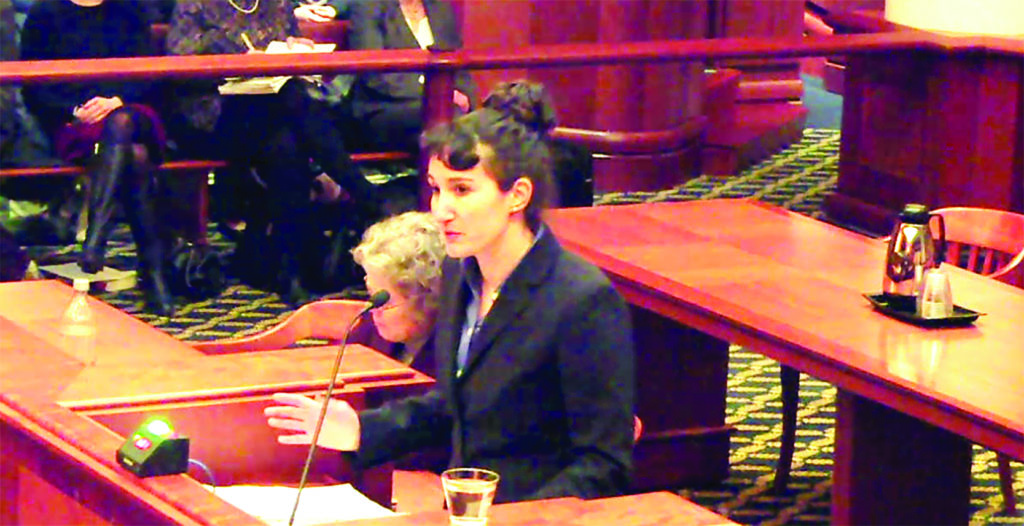
Senior Attorney Jenny Rushlow successfully argued CLF’s case before Massachusetts’s Supreme Judicial Court, asserting that the Commonwealth had failed to fully implement its landmark climate law, aimed at drastically cutting carbon pollution in the state by 2050.
In 2014, CLF faced a crossroads in its efforts to address the growing climate crisis. In Massachusetts, the Commonwealth’s groundbreaking climate change law, the Global Warming Solutions Act (GWSA), was gathering dust as the State missed key deadlines for putting in place required regulations to cut its greenhouse gas emissions.
CLF had fought hard to pass the GWSA back in 2008. With the clock ticking to meet the GWSA’s ambitious emissions goals, the organization made a number of unsuccessful attempts to work with the Commonwealth to fully implement the law. By 2014, the State’s lack of action had begun to endanger the GWSA’s first legal milestone: to cut climate pollution by 20 percent below 1990 levels by 2020.
With the State insisting it had done enough to enact the law, CLF had to make a choice: to continue trying to work behind the scenes or to fight it out in the courts and let them rule on the true intent of the GWSA. CLF chose to fight.
Anytime CLF files a lawsuit, there’s a calculated risk. “We’ve always been edgy,” says Greg Cunningham, Vice President and Director of CLF’s Clean Energy and Climate Change program. “But we recognize that there is a risk in everything we’re doing, and so we don’t make these decisions lightly.” In this case, CLF’s legal advocates spent months weighing the plusses and minuses of action and the best way to carry it out.
They knew that, even without full implementation, the GWSA was a valuable tool in the organization’s advocacy efforts. Largely thanks to the State’s inaction, CLF had stepped in itself to hold power plant and pipeline developers accountable to the law’s emissions goals. If a judge were to disagree with the organization now, would that endanger an important tool in the fight to cut carbon pollution?
After much thoughtful discussion and exhaustion of other avenues, Cunningham explains that “ultimately, it was the recognition that the principal work of this critical law wasn’t getting done” that led CLF to bring its fight to the courts. The GWSA was just too important to be ignored.
The decision made, the next step was to assemble the legal case. That meant finding the right partners to act as plaintiffs in the suit. A shared frustration with the Commonwealth’s lack of action on the GWSA brought the Massachusetts Energy Consumers Alliance to the table. Alongside CLF and Mass Energy stood four local high school students represented by Sugarman Rogers Barshak & Cohen. The students brought with them a compelling sense of urgency. They embodied “that most vulnerable group that will own the problems that we fail to fix today,” Cunningham says.
Two years after it was filed, the lawsuit came before the Massachusetts Supreme Judicial Court. A lower court had already rejected CLF’s argument, but Cunningham and his team felt buoyed by the State’s highest court agreeing to hear the case.
They were right to. After hearing the arguments led by CLF Senior Attorney Jenny Rushlow, the Supreme Judicial Court handed down a landmark decision requiring the State’s Department of Environmental Protection to establish regulations to implement the GWSA fully. CLF was thrilled by the decision and the strong encouragement in the words of the justices that Cunningham says reflected “a human responsibility and a societal responsibility” to address climate change.
With the court case resolved, CLF shifted from being the State’s antagonist to its ally, ready and eager to work with the Commonwealth to set in motion the long overdue regulations. The Baker administration responded swiftly. Within days of the court’s decision, the Department of Environmental Protection reached out to CLF and asked for input on the proposed regulations. The State’s open and inclusive process not only resulted in the release of new regulations in August 2017, it also helped to establish a collaborative and productive relationship between CLF and the Department of Environmental Protection, to the benefit of all involved.
It takes preparation, passion, and cooperation to achieve a striking win with such far-reaching consequences for the climate, Massachusetts, and children around the country. The Commonwealth is now able to show other states that they can take strong action on climate and, as Cunningham says, “the sky won’t fall if you act. The economy can not only chug along, it can thrive; at the same time, you will be addressing the greatest threat to our civilization and our region.”
With federal rollbacks on climate action ongoing, this kind of local leadership is more important than ever. Through well-calculated risks and carefully implemented action, CLF and its allies have ensured that Massachusetts will continue to lead the region, and the nation, in fighting climate change. And CLF now has a proven model for pushing for legal climate goals in other states that will usher in the end of the era of fossil fuels in New England.



